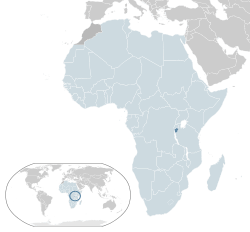November 1966 Burundian coup d'état
| November 1966 Burundian coup d'état | |||||||
|---|---|---|---|---|---|---|---|
 | |||||||
| |||||||
| Belligerents | |||||||
|
| Army faction | ||||||
On November 26, 1966, Michel Micombero, Burundi's 26-year-old Prime Minister ousted the 19-year-old Burundian King, Ntare V, in a coup. Ntare V was out of the country at the time of the coup and the coup leaders quickly succeeded in deposing the Monarchy. Micombero declared an end to the monarchy and the Kingdom of Burundi became a republic with Micombero as its first President.[1] The coup was the third Burundian coup in 13 months and Micombero, a Tutsi, ruled the country for the next 10 years, including during the genocide in 1972. Micombero was eventually ousted during a bloodless coup in 1976 coup.[2]
Background
The November coup of 1966 was the last of three coups to take place in Burundi during 1965 and 1966. The previous coups (in November 1965 and July 1966) followed the assassination of the country's Prime Minister, Pierre Ngendandumwe on 15 January 1965, and the country's first parliamentary elections in May 1965. The assassinations, attempted coups, contentious elections and ethnic cleansing campaigns combined to make the period immediately following independence a tumultuous one for Burundian society.
References
- ↑ New York Times, MICHEL MICOMBERO, 43, DIES; FORMER PRESIDENT OF BURUNDI UPI, Published: July 18, 1983, http://www.nytimes.com/1983/07/18/obituaries/michel-micombero-43-dies-former-president-of-burundi.html
- ↑ http://encyclopedia2.thefreedictionary.com/Michel+Micombero